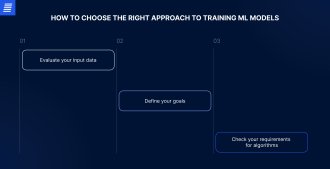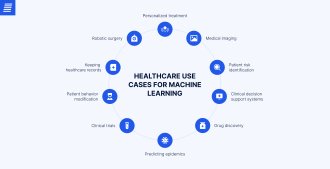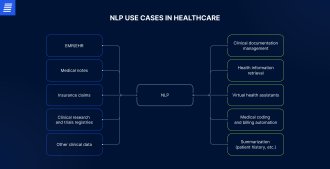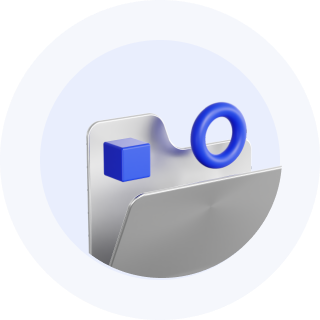
Contact us
Our team would love to hear from you.

In this article, we will explain what machine learning (ML) is, what benefits it brings to the healthcare industry, and which ML approaches to learning ML models are used.
Machine learning is a powerful technology that teaches computers to learn from experience. By using mathematics, ML algorithms learn independently from data without the presence of machine operators. The more data is available for learning, the better ML algorithms perform. In other words, algorithms find patterns in data, learn from them, and make conclusions.
In healthcare, ML algorithms process and analyze large amounts of healthcare data and find insights that are impossible to detect manually. They can also predict outcomes, provide risk assessment, and much more.
ML-based solutions, however, are not meant to replace healthcare professionals. Such tools are designed to assist and to work in conjunction with them.
Whether they are used in drug development or patient treatment, ML solutions are changing healthcare for the better.
To train ML models, several approaches can be used. They differ depending on the data sets provided and extent to which they are pre-processed by humans. Data sets can be unlabeled (raw) or labeled (prepared by data scientists).
Therefore, to choose the right approach, it is important to understand which data will be available, whether data scientists can be engaged to prepare data sets, and what specific problems need to be solved.
Three main approaches to training ML models are used:
Along with gathering data, the supervised learning approach requires a number of preparatory steps so that acquired data can be applied. According to this approach, ML algorithms use provided input data and known responses to do the following:
Therefore, supervised learning is mostly used for forecasting and classification issues. In general, supervised learning is considered to be accurate, however there are factors that can affect its accuracy:
Additionally, this approach requires significant computational and human resources to prepare large amounts of quality data sets.
Despite these limitations, supervised learning is widely used in healthcare. Here are a few examples of supervised learning algorithms and their practical applications:
In unsupervised learning, ML algorithms use unlabeled input data sets. These algorithms discover patterns or information in raw data without human intervention or given instructions. Unlabeled data for unsupervised learning is obtained through collection and observation.
Due to the absence of human intervention, unsupervised learning algorithms can perform more complicated tasks than supervised learning algorithms: discover virtually all kinds of patterns in data and find features to use for classification.
Typical tasks performed by unsupervised learning algorithms are clustering, dimensionality reduction, and anomaly detection.
In healthcare, unsupervised learning algorithms are applied in areas such as genomic sequence analysis, market research, objective recognition, and correct features (variables) selection for healthcare data pre-processing.
However, when choosing this approach, it is important to remember that the results obtained from unsupervised learning can be unpredictable and need to be carefully interpreted.
Below, we will highlight the distinctions between the approaches and provide recommendations for selecting the best method for you.
Apart from labeled data, there are a number of other differences between supervised and unsupervised learning.
Supervised learning is aimed at predicting outcomes for new data when the result type is pre-defined. The goal of unsupervised learning is to get insights from new data. Unsupervised learning algorithms themselves define hidden patterns in data sets.
Supervised learning is ideal for forecasting and predicting tasks. Unsupervised learning is used for detecting anomalies, making recommendations, and interpreting medical images.
Even though supervised learning requires preparation, this approach is pretty simple compared to unsupervised learning. To work with unsupervised learning models, which imply large amounts of unclassified data, powerful computational tools are needed. In addition, unsupervised learning models need more data to produce outcomes.
Unlike unsupervised learning, supervised learning is time-consuming and requires highly skilled data specialists to label data.
On the other hand, human operators need to prove accuracy and applicability of outcomes delivered with the help of unsupervised learning.
To make the right decision, we recommend you to follow these steps:


When the amount of data is huge and it is hard to identify relevant features from data, semi-supervised learning comes into play. Data sets for semi-supervised learning contain both labeled and unlabeled data, whereas the percentage of labeled data can be relatively small, e.g. 10%. This approach can be of great help in medical imaging: only MR images of malignant tumors can be labeled, a machine then can detect patients that require attention in this regard.
In the following section, you will find real-world examples that show how the healthcare sector might benefit from using ML technologies.


ML-based tools can facilitate maintaining medical records, in particular, EHRs. This challenging task comprises regular updates of existing data and new data entry. Despite advancements in technology, keeping medical records is still time-consuming and prone to errors due to fractured interfaces and monotonous processes. Smart healthcare record systems driven by ML technologies come with text and medical speech recognition options and advanced analytics tools. Such tools allow for the digitization of paper copies, the conversion of oral communication between patients and doctors into written text, and ensure the maintenance of accurate and up-to-date patient health records.
In addition, these solutions can support healthcare professionals in diagnosis and decision-making.

Patient risk prediction is one of the most promising applications of ML in healthcare. By analyzing large amounts of historical patient data, ML models are trained to predict the state of a patient and the likelihood of disease progression in the future. This allows healthcare providers to identify high-risk patients early on and offer targeted care to them.
Treatment protocols provide standardized treatment methods for specific conditions. However, patients may often respond differently to the prescribed treatment. ML techniques enable doctors to find patient-specific treatment options based on input data (lab test results, genetics, nutrition, etc.).
In healthcare, the interpretation of medical images has been traditionally carried out by radiologists and physicians. However, it can be very challenging due to numerous pathologies and subtle changes that may be difficult for the human eye to detect. ML algorithms can be trained to recognize complex malignancy patterns, even in difficult cases or at early stages of disease. As a result, ML tools are becoming particularly helpful in diagnosing and planning efficient treatment.
Clinical research involves complex, labor-intensive and expensive processes that are prone to errors and deviations. These errors and deviations can lead to the failure of successful trial implementation and acceptance. ML, however, can improve operational and scientific efficiency of clinical trials by facilitating the selection of trial participants, optimizing data collection procedures, and analyzing results.
By utilizing ML-based solutions, researchers can effectively manage large and heterogeneous data sources, identify hidden patterns, and predict the outcomes of clinical trials.
When it comes to the application of ML in healthcare, one of the most impactful areas is robotic surgery. ML can be used to cope with various tasks within the field, including but not limited to:
Robotisation of suturing. Even though suturing is an important part of surgical operations, it can be tedious and exhausting. Automating the suturing process can reduce the duration of surgeries as well as ease the burden on operating doctors.
Surgical workflow modeling. Since operations today are becoming more and more complex, continuous improvement is necessary. One innovative approach is surgical process modeling, which aims to enhance safety and efficiency in today’s sophisticated procedures. With the help of ML techniques, surgical workflows can be recreated and models can be constructed taking into account factors such as practitioner’s expertise and patient-specific information, including health status and clinical history. As a result, ML can be of great help in making reliable and timely surgical decisions.
In addition, surgical procedure models can be used for other purposes beyond actual surgery, such as evaluating and training surgeon skills, analyzing workload, introducing new technologies, and predicting procedure duration.
Up-to-date technologies make it possible to forecast epidemic outbreaks based on analysis of vast amounts of data. For prognostication, spread of epidemics in specific areas, along with climatic, demographic, geographic and other factors, is analyzed. This helps identify areas prone to outbreaks and subsequently manage the potential spread of a disease, especially in areas with little or no healthcare facilities.
CDSS, relying on ML, can analyze large volumes of data, suggest the next treatment options, identify potential issues, and enhance the efficiency of care teams. Typically, decisions related to diagnosis are made using limited patient data. In a CDSS, data of an individual patient are matched to a computerized clinical knowledge base, allowing for patient-specific assessments or recommendations. The latest advances in the development of CDSSs help clinicians make better informed diagnosis, recommend treatment options, and evaluate potential outcomes.
Factors like smoking or lack of physical activity can easily trigger the development of chronic diseases or worsen their course. These factors can be managed or avoided by maintaining healthy habits, which requires guidance and adherence.
To help patients adjust their behavior and adopt a healthier lifestyle, ML-based solutions can be very useful. ML algorithms use patients’ input data (e.g. from wearables) related to their daily activities, analyze them, identify habits and routines, and create personalized plans with constant monitoring of effectiveness.
The discovery of a valuable drug requires significant investments of time and resources. Thousands of molecules and their combinations must be tested before the right composition is identified. However, utilizing machine learning algorithms in healthcare can accelerate this process by quickly and accurately predicting molecular properties, allowing for more efficient identification of potential drugs.
Here are the main advantages that implementation of ML methods in the healthcare sector can bring.
One of the most remarkable features of ML in healthcare is the ability to provide services tailored to specific patient needs such as individual treatment options, recommendations, healthy lifestyle plans, etc. As the customer-centric approach is becoming increasingly prevalent in healthcare, creating a personalized experience for each patient is a key goal in the sector, and ML is an extremely valuable tool for achieving this goal.
A great example of using ML tools is in research and drug development. By speeding up drug discovery processes, including advanced sequencing methods and cutting-edge manufacturing workflows, we can reduce drug development costs and time-to-market for pharmaceutical companies. This benefits clinicians by providing them with new treatment scenarios for their patients. In addition, ML algorithms can facilitate the selection of clinical trial participants, analyze trial participants data, and reduce data-based errors.
The primary importance of implementing machine learning in healthcare is to help overcome hurdles, speed up the workflows, and meet patient demands.
Machine learning helps clinicians streamline diagnostics and improve decision-making by processing enormous healthcare data sets and making insightful conclusions and predictions in just a few minutes.
ML is already improving healthcare with true impact lying in thoughtful integration. ML-based technologies have the potential to make care more proactive and personalized as well as support data-driven decision-making.
Deep learning, a subfield of artificial intelligence (AI) and ML, uses multilayered neural networks, or deep neural networks, to process data, imitating complex human-brain-like decision-making processes. In healthcare, this method is particularly effective in medical imaging, data analytics, and hospital operations optimization. It is particularly valuable in processing aggregated EHRs, whether structured or unstructured, image segmentation and enhancement, and disease detection and diagnosis. Built on deep learning architectures, large language models (LLMs) further expand these capabilities, enabling advanced clinical decision support, streamlined clinical documentation, and improved patient communication.
NLP combines ML and deep learning algorithms to understand, interpret, and generate human language. These capabilities can be applied to extract symptoms, diagnoses, treatment plans, and lab results from unstructured medical notes, summarize patient histories, and derive insights from medical records and literature, supporting clinical decisions. NLP is also integral to creating virtual health assistants and analyzing patient sentiment. The technology also automates speech-to-text transcription of clinical notes and streamlines medical coding and billing, improving their accuracy and efficiency.


Computer vision, an ML-based technology, enables learning and pattern recognition from visual data. In healthcare, it has applications in medical imaging and diagnosis, enhancing surgical precision, real-time patient monitoring, telemedicine, and more. The technology empowers healthcare providers to offer more precise and advanced care.
A major healthcare service provider in the southwestern U.S. turned to EffectiveSoft to handle the daily load of vast amounts of patient data generated across its network of facilities. With our expertise in developing AI and ML solutions, we tackled challenges like siloed patient information, data overload, and inability to extract meaningful insights.
Leveraging AI and NLP, our team designed and created a comprehensive patient data platform integrated with the EHR infrastructure already in place. The platform supports:
The solution we developed allowed our client to significantly improve patient care and operational efficiency. With faster access to full, structured patient data, healthcare providers can make more accurate diagnoses and provide timely treatments.
Machine learning has proved to have many benefits for healthcare, yet medical organizations still face some challenges when implementing ML solutions. By identifying the specific needs of your healthcare facility and implementing the appropriate machine learning solution, many of these concerns can be addressed. This is where EffectiveSoft comes in. With our extensive experience in AI and ML research and healthcare software development, as well as our team of top-notch engineers, we are well-equipped to help you with your healthcare project.
Our team has a broad range of expertise in ML, from recommendation systems to risk prediction solutions.
Don’t hesitate to contact us. We are happy to help with your healthcare project by leveraging the power of machine learning.
Together with EffectiveSoft, you will be able to unlock the potential of ML for your healthcare facility and your patients.

ML in healthcare involves computer systems that learn from data, mimicking human learning, to facilitate and automate routine and complex tasks in the healthcare industry. ML-powered software uses medical data, like patient records, imaging, lab results, to make predictions and decisions, create personalized treatment plans, and forecast outcomes.
ML offers numerous advantages for healthcare providers, from personalization to precision. Using ML algorithms streamlines significant processes like diagnosis, patient treatment and monitoring, and administrative tasks. ML supports data-driven decision-making and accurate predictions, improving outcomes.
AI and ML are already transforming the healthcare sector with healthcare facilities increasingly adopting these technologies. ML algorithms have the potential to enhance patient care through early disease detection and diagnosis, personalized treatment based on unique genetics, lifestyle, and environment. The technology is also set to change health care from reactive to preventive.
ML is designed to assist healthcare professionals and not replace them. While ML systems facilitate decision-making, making it quicker and more accurate, it still requires human oversight to generate value.
To ensure sensitive patient data is protected, ML systems require proper management. EffectiveSoft engineers create ML-powered solutions in compliance with regulations like HIPAA and GDPR, guaranteeing security and privacy of patient data.
Can’t find the answer you are looking for?
Contact us and we will get in touch with you shortly.
Our team would love to hear from you.
Fill out the form, and we’ve got you covered.
What happens next?
San Diego, California
4445 Eastgate Mall, Suite 200
92121, 1-800-288-9659
San Francisco, California
50 California St #1500
94111, 1-800-288-9659
Pittsburgh, Pennsylvania
One Oxford Centre, 500 Grant St Suite 2900
15219, 1-800-288-9659
Durham, North Carolina
RTP Meridian, 2530 Meridian Pkwy Suite 300
27713, 1-800-288-9659
San Jose, Costa Rica
C. 118B, Trejos Montealegre
10203, 1-800-288-9659